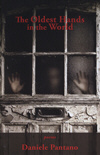The Oldest Hands in the World
Daniele Pantano is a Swiss poet, translator, critic, editor, and Senior Lecturer in Creative Writing at Edge Hill University in England. Work from this volume was published in numerous journals and anthologies in the U.K., Germany, Italy, Australia, Switzerland, Canada, and the U.S.
Daniele Pantano is a Swiss poet, translator, critic, editor, and Senior Lecturer in Creative Writing at Edge Hill University in England. Work from this volume was published in numerous journals and anthologies in the U.K., Germany, Italy, Australia, Switzerland, Canada, and the U.S.
Pantano is a storyteller with an appreciation for poetry’s ability to convey whole lifetimes in a confined space. He is an economical poet, adept at crafting a taut, clean line behind which lies all the messy emotion of narrative (“Finally. Dessert. He opened / The shutters and revealed / Everything that would cease / To matter the next day.”). He favors poems that begin in media res (“How wonderfully it all matches” or “As for the farmer” or “Their last embrace”), which is, in many ways, the work of every poem, taking us inside a larger story that started before our reading and will (in the best of instances) echo long after. He is never dull, presenting a variety of engaging forms. And he is never repetitive, tiresome, or predictable. The volume includes prose poems, hybrid forms, short lyrical bursts, short numbered poetic fragments, and poems composed of a single couplet (“I saw her in the mirror of the burnt hall / Her black hair spreading across Europe.”—a poem titled “The Stranger”).
There is throughout the book a tone that moves, waivers, hovers between yearning and grief, expectation and despair, desire and determination. Just when I think the poet’s given up (“I’m alone. The porch. Empty. / Except for a wooden ashtray. / Still. She’s there. My neighbor / Cancerous. Rotting. I watch.), he surprises me and saves himself (“…I turn the ashtray. Over-Flowing. Not with the usual cut / Stems. But small flower heads / Of the most delicate white flesh.”)
The work is delicate, but not flimsy; elegant, but not precious; emotionally charged, yet restrained. The poet is an unsentimental father (here is “Lullaby” in its entirety):
Through my window.
Myths of grapes. Cacti.
Burning field. I notice
My daughter’s slumberous
Smile. Cough heavily
Across waters. Flames
Rise to devour a hill
Amidst the Sicilian night.
He’s a savvy anthropologist (here is an excerpt from the title poem):
On this chair, as I am every morning, waiting
For the cappuccino and brioche to arrive,
And the girl with the oldest hands in the world,
I sense exile is a city reared by eternal artifice.
All sweet violence and thought and repetition.
And he’s part philosopher, part psychologist, part prophet (here is an excerpt from the book’s final entry, a prose poem, “Late December”):
No one misses the ordinary. Not even the blackbirds. Just as no one, on either side, misses the end of the world.
I would, without doubt, miss a world in which poems like Pantano’s did not exist.





